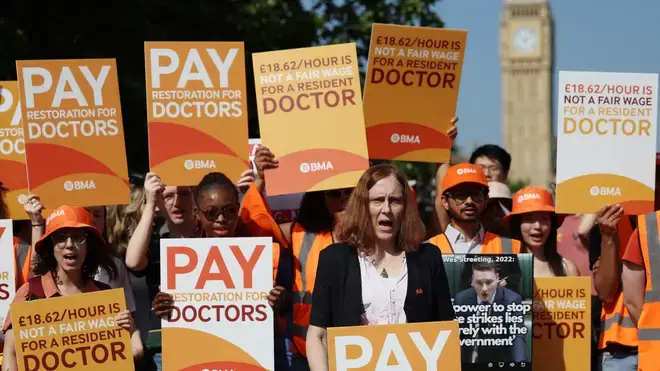Nick Ferrari is joined by Regional Medical Director, Chris Streather
Resident doctors across the UK have begun a five-day walk out over pay – a move that's led an NHS director to declare "enough is enough".
Speaking with Nick Ferrari at Breakfast, Chris Strether, Regional Medical Director for the NHS, warned the walkout would cause "terrible disruption to the lives of people" across the UK.
"Each time it happens across the country, 60,000 appointments are delayed. And I think really is it really is time to say enough is enough."
Thousands of resident doctors – formerly known as junior doctors, have begun strike action across the UK as they demand a 29 per cent pay rise.
Striking doctors say their demands are simple – restore pay to 2008 levels, but data suggests support for doctors among the public is waining.
After strikes kicked off on Friday across the country, Health Secretary Wes Streeting insisted he and NHS colleagues are "doing everything we can to minimise patient harm during strike".
The Prime Minister also raised concerns that fears surrounding strike action will "blight" patients and cause "real damage".
It comes after Sir Keir Starmer issuing a stark warning to doctors on the eve of the strikes, insisting that action will embolden NHS detractors at a critical juncture.
"I'd really like resident doctors to reconsider their decision to take industrial action and I don't think striking now is the right answer," Mr Strether added.
"And I'd like the BMA to soften their approach. I don't think there's realistic chance that they will get significant wage increases. They had quite a significant wage increase last year, 22% over two years, just."
Striking medics gathering outside hospitals across the UK, including London's St Thomas' Hospital, holding placards reading “£18.62/hour is not a fair wage for a resident doctor”, and “Pay doctors, not PPP.”
Others held signs depicting an old tweet by Health Secretary Wes Streeting, accusing the previous government of failing to prevent strikes.
One man is standing beside the striking doctors, selling copies of The Socialist newspaper to passers-by.Chants of “What do we want? Fair pay. When do we want it? Now” echo across the bridge.
Doctor Adi calls James O’Brien to share his views on the doctors’ strike
Sir Keir expressed concern the industrial action will "play into the hands of those who do not want our NHS to succeed in its current form" and will "choke off its recovery".
Urging doctors not to pursue this "damaging road", the Prime Minister said: “Most people do not support these strikes. They know they will cause real damage.
"Behind the headlines are the patients whose lives will be blighted by this decision. The frustration and disappointment of necessary treatment delayed. And worse, late diagnoses and care that risks their long-term health."
He continued in The Times: “It’s not fair on patients. It’s not fair on NHS staff who will have to step in for cover for those taking action. And it is not fair on taxpayers.
"These strikes threaten to turn back the clock on progress we have made in rebuilding the NHS over the last year, choking off the recovery.”
The British Medical Association (BMA) is pushing for the increase to match how much it claims doctors’ pay has fallen since 2008-09.
Sir Keir said: "We wanted to reach a good agreement that serves the interests of doctors and patients alike, not see doctors out on strike. In a tough time for our country, we all need to pull together to deliver a fairer deal for everyone."
The Prime Minister joins numerous NHS bosses in criticising the strike, including Sir Jim Mackey, who said doctors should not be 'consequence-free'.
Sir Jim said those looking to take on overtime to clear backlogs once the industrial action is over should be blocked from doing so.
He also said the NHS would be 'much more resistant' to demands from the BMA, which is staging its 12th strike since March 2023.
The NHS chief told the public to continue using services as usual and urged hospitals to keep routine operations and appointments running.
Hospitals and local teams have spent this week preparing for the strike, which is scheduled to begin at 7am on Friday, after five days of talks between the government and the BMA failed to deliver a compromise.
GP surgeries, urgent care and A&E departments will continue to operate as usual for those who need them, NHS England said.
For urgent but not life-threatening issues, the public has been told to use 111 online as the first port of call.
Last June, close to 62,000 inpatient and outpatient appointments were rescheduled following a resident doctors' strike.
Almost 1.5 million appointments have been rescheduled since the end of 2022 as a result of industrial action.
The BMA has been clear that strike action will only be reversed if the Government improves its 5.4% pay offer.
Health Secretary Wes Streeting said he would continue talks with the union if they postpone the strike, but insisted that he wouldn’t increase his pay offer.
This failed to convince the doctors’ union, which maintains that their main reason for striking is to achieve better pay.

